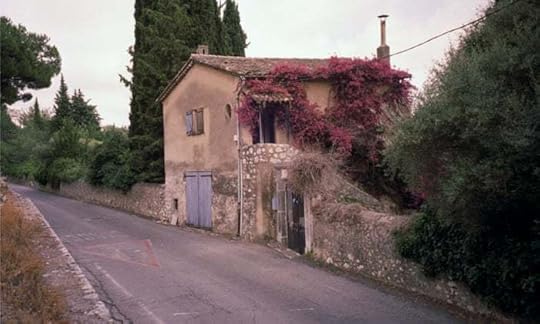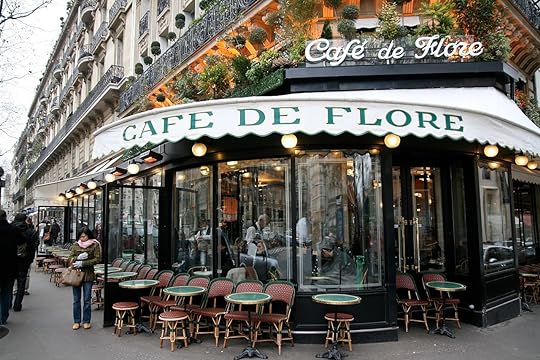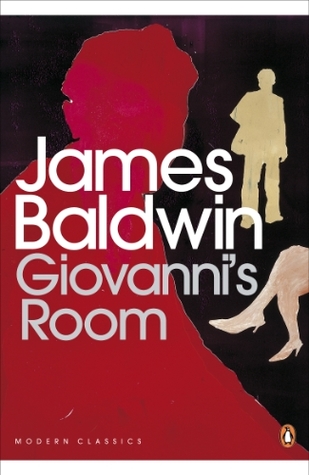Jim Fonseca's Reviews > Giovanni’s Room
Giovanni’s Room
by

by

[Revised 11/18/22]
A great novel. The word “ferocious” comes to mind when I think of the intensity of several key scenes in the novel where the main character, a gay man in Paris, struggles to turn against his gay orientation and tries to find happiness with a woman he has pledged to marry. The novel, published in 1956, is considered a classic of gay literature.
SOME SPOILERS FOLLOW
Several scenes that vividly impart to the reader that intensity of feeling are when he leaves his male lover, when his female lover learns his secret and leaves him, and when his ex-lover encounters an exploitative bar owner. Giovanni is not the name of the main character, but of his male lover.

Two major tensions in the story we know from the start and they flavor everything that follows in the novel: the impending execution of Giovanni by guillotine and the return of his woman friend from Spain. The main character intends to marry the woman and end his gay relationship. He’s in Paris to “find himself,” a phrase he writes is uncommon in other languages and implies something is misplaced.
The main character had an early sexual experience with a young man back in the US that has shamed and frightened him for life. We read lines like this: “For shame! That I should be so abruptly, so hideously entangled with a boy...” Such were the times that all the gay male characters in the novel joke among themselves about having women or going back to women, almost as if they are all still afraid of fully coming out even before their gay companions. There are customs back in 1956 that I would have thought were developed more recently, for example, when a group of young gay men gather in the bar, they refer to each other as “she.”
Baldwin is a master at portraying the tiny but significant looks and gestures that go around at a meeting of a half-dozen people in bar eating oysters and drinking white wine. (I wrote a similar thing about John O’Hara in his Appointment in Samarra.)

There’s good writing: “I thought she would be fun to have fun with.”
“I did not owe an awful lot of money, only around six thousand francs, but Parisian hotel-keepers have a way of smelling poverty and then they do what anybody does who is aware of a bad smell; they throw whatever stinks outside.”
“My father….wanted me to come home, as he said, and settle down, and whenever he said that I thought of the sediment at the bottom of a stagnant pond.”
“I remember that life in that room seemed to be occurring beneath the sea. Time flowed past indifferently above us; hours and days had no meaning.”
“You don’t have a home until you leave it and then, when you have left it, you can never go back.”
It’s helpful to know basic French even though most of the phrases in French can be understood in context.

The author, Baldwin, was a gay Black man but the main character is a blonde white man. I thought perhaps the author is saying “let’s deal with one thing at a time.” To say the novel is a classic of gay literature confines it to a category. I would say “it’s a classic,” period. It ranks very high on GR ratings– a 4.4. I’m adding it to my favorites. Thank you to Laura for the recommendation.
Top photo, the author's home in St. Paul de Vence, Provence from theguardian.co.uk
The cafe in Paris where Baldwin wrote Go Tell It on the Mountain from Wikipedia
The author (1924-1987) from aalbc.com
A great novel. The word “ferocious” comes to mind when I think of the intensity of several key scenes in the novel where the main character, a gay man in Paris, struggles to turn against his gay orientation and tries to find happiness with a woman he has pledged to marry. The novel, published in 1956, is considered a classic of gay literature.
SOME SPOILERS FOLLOW
Several scenes that vividly impart to the reader that intensity of feeling are when he leaves his male lover, when his female lover learns his secret and leaves him, and when his ex-lover encounters an exploitative bar owner. Giovanni is not the name of the main character, but of his male lover.

Two major tensions in the story we know from the start and they flavor everything that follows in the novel: the impending execution of Giovanni by guillotine and the return of his woman friend from Spain. The main character intends to marry the woman and end his gay relationship. He’s in Paris to “find himself,” a phrase he writes is uncommon in other languages and implies something is misplaced.
The main character had an early sexual experience with a young man back in the US that has shamed and frightened him for life. We read lines like this: “For shame! That I should be so abruptly, so hideously entangled with a boy...” Such were the times that all the gay male characters in the novel joke among themselves about having women or going back to women, almost as if they are all still afraid of fully coming out even before their gay companions. There are customs back in 1956 that I would have thought were developed more recently, for example, when a group of young gay men gather in the bar, they refer to each other as “she.”
Baldwin is a master at portraying the tiny but significant looks and gestures that go around at a meeting of a half-dozen people in bar eating oysters and drinking white wine. (I wrote a similar thing about John O’Hara in his Appointment in Samarra.)

There’s good writing: “I thought she would be fun to have fun with.”
“I did not owe an awful lot of money, only around six thousand francs, but Parisian hotel-keepers have a way of smelling poverty and then they do what anybody does who is aware of a bad smell; they throw whatever stinks outside.”
“My father….wanted me to come home, as he said, and settle down, and whenever he said that I thought of the sediment at the bottom of a stagnant pond.”
“I remember that life in that room seemed to be occurring beneath the sea. Time flowed past indifferently above us; hours and days had no meaning.”
“You don’t have a home until you leave it and then, when you have left it, you can never go back.”
It’s helpful to know basic French even though most of the phrases in French can be understood in context.

The author, Baldwin, was a gay Black man but the main character is a blonde white man. I thought perhaps the author is saying “let’s deal with one thing at a time.” To say the novel is a classic of gay literature confines it to a category. I would say “it’s a classic,” period. It ranks very high on GR ratings– a 4.4. I’m adding it to my favorites. Thank you to Laura for the recommendation.
Top photo, the author's home in St. Paul de Vence, Provence from theguardian.co.uk
The cafe in Paris where Baldwin wrote Go Tell It on the Mountain from Wikipedia
The author (1924-1987) from aalbc.com
Sign into Goodreads to see if any of your friends have read
Giovanni’s Room.
Sign In »
Reading Progress
May 25, 2020
–
Started Reading
May 28, 2020
– Shelved
May 28, 2020
– Shelved as:
gay-theme
May 28, 2020
– Shelved as:
france
May 28, 2020
– Shelved as:
favorite-books
May 28, 2020
–
Finished Reading
Comments Showing 1-18 of 18 (18 new)
date newest »
newest »
 newest »
newest »
message 1:
by
Quo
(new)
-
rated it 5 stars
May 30, 2020 12:28PM
 In reading Wm. Stryon's novel, The Confessions of Nat Turner, it was mentioned that at some point the author befriended James Baldwin & with Baldwin in search of a quiet refuge, Stryon offered him the coach house of his home just outside of Boston. It was there that Baldwin worked on Giovanni's Room, with the two authors apparently having many intense late night discussions, fueled my strong drink & a mutual respect. While I haven't yet read this book by James Baldwin, he stood as a masterful writer & an amazingly perceptive man.
In reading Wm. Stryon's novel, The Confessions of Nat Turner, it was mentioned that at some point the author befriended James Baldwin & with Baldwin in search of a quiet refuge, Stryon offered him the coach house of his home just outside of Boston. It was there that Baldwin worked on Giovanni's Room, with the two authors apparently having many intense late night discussions, fueled my strong drink & a mutual respect. While I haven't yet read this book by James Baldwin, he stood as a masterful writer & an amazingly perceptive man.
reply
|
flag
 Quo wrote: "In reading Wm. Stryon's novel, The Confessions of Nat Turner, it was mentioned that at some point the author befriended James Baldwin & with Baldwin in search of a quiet refuge, Stryon offered him ..."
Quo wrote: "In reading Wm. Stryon's novel, The Confessions of Nat Turner, it was mentioned that at some point the author befriended James Baldwin & with Baldwin in search of a quiet refuge, Stryon offered him ..."I have to read more Baldwin. The last (only) other work I recall is Go Tell It on the Mountain way back in college. Yes, truly an excellent writer
 I loved the book. Baldwin was a great writer and a very interesting and passionate activist. If you haven't seen it, I'd recommend you very much the documentary I am not your negro, based on his unfinished book Remember this house, about his recollections on civil rights movement.
I loved the book. Baldwin was a great writer and a very interesting and passionate activist. If you haven't seen it, I'd recommend you very much the documentary I am not your negro, based on his unfinished book Remember this house, about his recollections on civil rights movement.
 Ferran wrote: "I loved the book. Baldwin was a great writer and a very interesting and passionate activist. If you haven't seen it, I'd recommend you very much the documentary I am not your negro, based on his un..."
Ferran wrote: "I loved the book. Baldwin was a great writer and a very interesting and passionate activist. If you haven't seen it, I'd recommend you very much the documentary I am not your negro, based on his un..."Thanks for the recommendation. I've not seen it but I'll look into it.
 Sallie wrote: "To echo everyone else. A superb review! I wish I could be so masterful!"
Sallie wrote: "To echo everyone else. A superb review! I wish I could be so masterful!"Well thanks Sallie
 If I remember correctly, Baldwin got quite some flak for having written about white characters in this one.
If I remember correctly, Baldwin got quite some flak for having written about white characters in this one.
 Colin wrote: "A good review, Jim. Yes, 'ferocious' is a great word to describe this one.
Colin wrote: "A good review, Jim. Yes, 'ferocious' is a great word to describe this one.Cheers from CB"
Cheers Colin, yes very intense
 Great writer. And good example of what we were talking about the other day. American disident, something what is not very popular to mention when you are talking about "great American democracy".
Great writer. And good example of what we were talking about the other day. American disident, something what is not very popular to mention when you are talking about "great American democracy".
 Marina wrote: "Great writer. And good example of what we were talking about the other day. American disident, something what is not very popular to mention when you are talking about "great American democracy"."
Marina wrote: "Great writer. And good example of what we were talking about the other day. American disident, something what is not very popular to mention when you are talking about "great American democracy"."Yes, dissident is a good term!
 Jim, A very interesting take on a masterful novel by a young James Baldwin, who amazingly said that it would have been overwhelming for him as a writer to deal with the theme of a gay man in search of his sexual identity, while also dealing with "the Negro question". Giovanni's Room is a brief novel that communicates a great deal about life & identity. Bill
Jim, A very interesting take on a masterful novel by a young James Baldwin, who amazingly said that it would have been overwhelming for him as a writer to deal with the theme of a gay man in search of his sexual identity, while also dealing with "the Negro question". Giovanni's Room is a brief novel that communicates a great deal about life & identity. Bill







